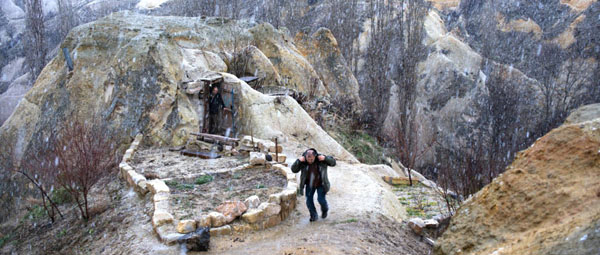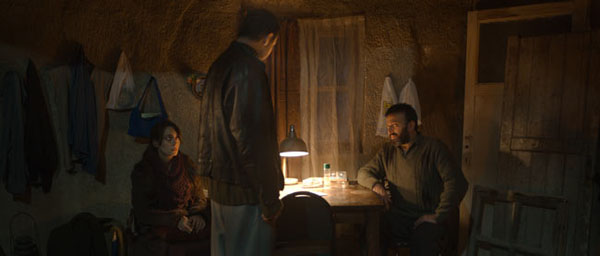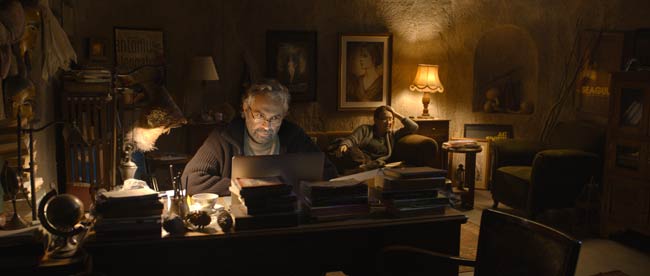“Nuri Bilge Ceylan is at the peak of his powers with Winter Sleep, a richly engrossing and ravishingly beautiful magnum opus that surely qualifies as the least boring 196-minute movie ever made,” begins Variety‘s Justin Chang. “Following Ceylan’s sublime 2011 drama Once Upon a Time in Anatolia, this equally assured but considerably more accessible character study tunnels into the everyday existence of a middle-aged former actor turned comfortably situated hotel owner—and emerges with a multifaceted study of human frailty whose moral implications resonate far beyond its remote Turkish setting.”
Aydin (Haluk Bilginer) “lives in a paradise,” writes Peter Labuza at the Film Stage: “a majestic collection of small houses for his pile of books, the guests he forms friendly relationships with for brief periods of time, and numerous warm fires that protect him from the harsh oncoming winter. He has also unknowingly built a prison for his sister [Demet Akbağ], his wife [Melisa Sözen], and himself, remaining so closed-off from the world that his thoughts have become deluded…. Anatolia made great use of gorgeous darkened landscapes as a backdrop for seemingly tangential, philosophical conversations. Winter Sleep instead emphasizes its relationships first, using these dialogues to reveal the interior being of its characters.”
For In Contention‘s Guy Lodge, “swaddling its many moments of intelligence and curiosity in turgid explication and self-admiring form, Winter Sleep is unabashed essay cinema that makes difficulty its prime artistic objective. Not difficulty of interpretation, you understand: Ceylan has perhaps never presented his ideas quite so forthcomingly, as his actors converse in self-sealed analytical paragraphs that allow little room for idiosyncratic reading or reflection. We’re talking sheer endurance here: love it or lump it, Winter Sleep is one tiring standstill.”
I’ll replace this trailer with one with English subtitles as soon as one appears
“In fits and starts, this is a stunning picture,” writes the Guardian‘s Xan Brooks. “At its best, Winter Sleep shows Ceylan to be as psychologically rigorous, in his way, as Ingmar Bergman before him. Certainly this harsh, heavy character study is unafraid to tackle such classic Bergman themes as moral responsibility and the existence of evil in a supposedly Godless universe. It proceeds to chew over them at length as the snow starts to fly and the fire gutters in the hearth. And yet still the doubts remain. On this evidence, Ceylan lacks the Swede’s banked intensity and his sweet command of a story’s arc.”
Barbara Scharres: “I count myself among the admirers of Ceylan’s past films, but Winter Sleep left me puzzled and unsatisfied by a film that talked itself in circles with a somewhat Chekhovian approach to class divisions, moral despair, and the characters’ extensively verbalized dissatisfaction with their lot in life.”
Also at RogerEbert.com, Michał Oleszczyk happened to see Winter Sleep immediately after watching How to Train Your Dragon 2 and found it “deeply satisfying to see those two films in the same venue back-to-back… Both films boast incredible, vast landscapes… What’s even more uncanny, both films were about male stubbornness and inability to compromise, with the seemingly weaker female characters as the carriers of compassion and grace.” And “they made me think of why is it that we go to see movies in the first place, and why are we so adamant about the division between ‘arthouse’ and ‘mainstream’ cinema.”
WINTER SLEEP invokes Chekhov, Dostoevsky, Shakespeare and Voltaire, and it fully belongs in their elite company. #cannes #palmedororbust
— Scott Foundas (@foundasonfilm) May 16, 2014
For Jessica Kiang at the Playlist, “the unpleasantness of being constantly trapped in the middle of conversations of increasing resentment and bitterness starts to take its toll less than halfway through this marathon-length film as we start to realize that just as the characters all seem defined by the overweening desire to have the last word in every discussion (the ‘and one more thing’ syndrome reaches epic, almost comical, proportions later on when scene after scene seems to have ended only for Aydin to chime back in with a another lengthy bit of speechifying), it’s a foible of Ceylan’s too. The overwriting of every single discussion smacks less of realistic debate than of a writer/director in the throes of a fit of didacticism who simply never trusts his audience to get his meaning without it being iterated and reiterated to the point of white noise.”
But for the Hollywood Reporter‘s Deborah Young, the “final half-hour is a joy to watch, as turning points follow in rapid succession. There are even a few moments of humor, like the foreman slipping on his icy boots, or a hilarious drunken revelry by the village teacher (Nadir Saribacak) that are welcome breaks from the solemn mood of a marriage coming apart at the seams…. As in all Ceylan’s flms, the landscape plays such a key role it should have an agent. Here the unearthly panorama of giant stones and blowing grass, dotted with Disney-like fairy-tale houses, is home to wild horses. At first the fog rolls in, then it begins to snow, giving DP Gokhan Tiryaki a landscape of the soul to mold with light.”
Updates: Winter Sleep is “is an epic portrait of a complete prick,” writes Mike D’Angelo at the Dissolve. “For a long while, Aydin seems like a decent enough fellow, friendly with his guests and reluctant to interfere in a dispute between his gofer (Ayberk Pekcan) and the pissed-off tenant (Nejat Isler) of a building he owns.” But during those arguments with his wife and sister, “while Aydin reveals himself in each of them as a selfish, passive-aggressive, uncaring, narcissistic asshole, Bilginer’s magnificently unsympathetic performance can’t maintain interest throughout Ceylan’s onslaught of subtext-free yakkity-yak. Considered in retrospect, Winter Sleep is an impressive achievement, admirable in every way, but I’d be lying if I claimed it wasn’t frequently an endurance test. Some movies really are just too damn long.”
“I have a very premature feeling that Winter Sleep could win the Palme,” offers the AV Club‘s A.A. Dowd. “It has Big Themes, strong performances, stunning images of the Turkish landscape, and Ceylan’s byline. What it doesn’t have is any good reason to be almost 200 minutes long…. There’s a powerful movie buried in the borderless sprawl of Winter Sleep. I just wish Ceylan had let it be a drama instead of inflating it into a monument to his expanding ambition.”
“Although nothing much happens in Ceylan’s drama, in a sense everything does,” suggests John Bleasdale at CineVue. “Power shifts, new ideas are awoken and an old patriarchy begins to crumble with the exposure of the injustices which supported it.”
“Always a novelistic filmmaker in structure, Ceylan has made his most literary work,” writes Indiewire‘s Eric Kohn. “It’s a robust, challenging experience he’s been building toward with his previous features, as well as an adventurous step above them.”
Dan Fainaru for Screen Daily: “No doubt every festival in sight will pick it up and every self-respecting art house will program it, but it’s worth looking beyond the ‘masterpiece’ label that will be stuck on it, to discover a deeply felt, powerfully delivered, observation on Turkish society, with reflections that could easily resonate everywhere else as well.”
Fabien Lemercier at Cineuropa: “Studying in depth the pretenses, the conflicts and the shades of human emotion, Nuri Bilge Ceylan also sketches an interesting picture of social classes (the wealthy, servants, teachers, the poor), a theme which he is especially fond of and which he sprinkles this time with touches of humor.”
Meantime, “Ceylan has expressed his dismay that no one has yet resigned from Turkey’s government over the Soma mine disaster,” reports Andrew Pulver in the Guardian. “Ceylan and his cast and crew all wore black ribbons to commemorate the Soma disaster, which has claimed the lives of over 300 miners, and which happened on the day before Cannes opened. They were also photographed holding up signs reading ‘#soma’ on the red carpet prior to the Winter Sleep premiere.” See, too, the video interview above.
Updates, 5/18: David Jenkins at Little White Lies: “In the way that Quentin Tarantino is often accused of implanting his own voice in the mouths of all of his characters—be they male or female, black or white, rich or poor—Ceylan too has made a film in which you can see his angular reflection in the eyes of everyone who appears on screen. And boy is it distracting…. In Bergman, people talk to one another. Here, they expound and pontificate in a fashion redolent of a theater production. It’s stiff. Ceylan never takes you to a place where you aren’t always cognisant of the fact that you’re watching a movie and hearing a script. This is correspondence-course Bergman.”
Reviewing Winter Sleep for Time Out, Dave Calhoun finds that “at its heart is something to which Ceylan keeps returning in films: a portrait of a restless, difficult man who feels out of time and place, and whose behavior does him no favors (a character familiar from almost all his work, not least Uzak, 2002, and Climates, 2006)…. At least twice, characters mention the role of ‘soap opera’ in their lives, and it feels as if Ceylan has set himself the challenge of writing a more talky, domestic drama without losing the wry observation and mystery of his earlier films; if so, he only half-succeeds.”
Updates, 5/19: “Ceylan, who is an accomplished still photographer as well, says that L’Avventura is one of his favorite films, and you can see that great work in this one,” notes Tom Christie at Thompson on Hollywood.
Ben Croll at Twitch: “Twisting the familiar, a simple interaction or the inside of a living room, into something heightened and uncanny highlights the film’s final verdict on Aydin. To turn the idiom around, he is proof of the evil of banality.”
“This movie’s true subject speaks very much to the ongoing conflict Ceylan has experienced between authenticity and artistic success,” writes Wesley Morris at Grantland. “But this is the first of his films to feature much more talking than doing, and a lot of the doing is set up by the talking, so he’s given himself no occasion to spring surprises.”
Updates, 5/21: “In the last hour the action breaks free and roams the countryside, seeking catharsis, even a redemptive, epiphanic comedy,” writes Nigel Andrews in the Financial Times. “As any 200-minute film should, this one grows and grows. By the end it has become a poignant Advent calendar of human hope, fear and battered but embattled optimism.”
Winter Sleep is an “even denser, more philosophically and emotionally draining experience than his masterpiece Once Upon a Time in Anatolia,” writes Jordan Cronk for Reverse Shot.
Update, 5/22: For Budd Wilkins, writing at the House Next Door, “in case there were any doubt as to the fatuousness of Ceylan’s approach here, look no further than [how] an excruciatingly protracted scene involving an envelope stuffed with money and a crackling fireplace telegraphs its inevitable conclusion from the start. Perhaps such inexorability is Ceylan’s true theme. If so, he still has to answer for taking nearly forever to get there.”
Update, 5/25: Now that Ceylan’s Winter Sleep has won the Palme d’or, Vulture‘s Bilge Ebiri, who has “been (for perhaps obvious reasons) obsessively following his career for well over a decade,” lists 17 things to know about him.
Updates, 6/2: “Winter Sleep is both Ceylan’s most epic and one of his most intimate films,” writes Blake Williams for Ioincinema; “indeed, it could easily have been conceived as a stage play rather than a film… Beautiful, exhausting, and at times excessively moralistic, it nonetheless represents a progression in the Turkish auteur’s work, and should propel his reputation past Yilmaz Guney as his country’s greatest filmmaker.”
“Winter Sleep is the most political of the director’s six features,” suggests Patrick Z. McGavin at filmjourney.org. “The movie’s social grievances and class conflicts sharply distill the conflict between the professional, bourgeois and modernist state and the encroaching fundamentalist strain. As outsiders, it’s hard not to sense a particular cultural schizophrenia.”
Update, 11/13: The Guardian‘s Peter Bradshaw meets Ceylan, who “says that he was inspired, not by Chekhov’s Three Sisters, but some of his short stories, and one in particular, but is reluctant to say which, for fear the film should be seen as an adaptation. ‘I don’t want to talk about it. It was a starting point. There was a little dialogue, but mainly description. You cannot say there was a story but there was a sense of life there.'”
Updates, 11/23: And Bradshaw now has a review: “Winter Sleep fascinates, saddens and occasionally amuses, at various points on its vast canvas, although I couldn’t help feeling that the landscape’s enormity worked better for Ceylan’s more violently disturbing film Once Upon a Time in Anatolia (2011), and that the bittersweet Chekhovian pastoral here might have been more intelligible in a more metropolitan or at least less isolated and more socialised setting, such as his Uzak (Distant) of 2002, although I accept the important point is that they are isolated.”
The Observer‘s Mark Kermode writes that “for all its oppressive staginess and perversely withheld cinematic pleasures (the eye-catching Cappadocian settings are eschewed for interiors shot by Gökhan Tiryaki in what is best termed ‘widescreen claustrophobia’), Winter Sleep is an engrossing work, a finely observed portrait of collapsing social contracts, public and private. While it may not scale the spine-tingling heights of Once Upon a Time in Anatolia, this Cannes Palme d’Or winner reconfirms Ceylan as a film-maker at the peak of his powers—singular, insightful, compassionate.”
Winter Sleep “makes talk seem action,” writes Nigel Andrews in the Financial Times. “Apocalypse hovers in the story’s eaves. Everyone is goaded mentally to remould his/her existence. After three hours in which ‘nothing happens,’ we realise everything from the ground upward has happened. We feel the aftershocks, subtle yet seismic, long after we leave the epicentre/auditorium.”
On the other hand, Sophie Monks Kaufman at Little White Lies: “The unfortunate truth invading Winter Sleep is that for all its lofty ideas and magnificent landscapes, it is often hellaciously boring.”
Will Tizard interviews Tiryaki for Variety.
Update, 11/24: “Winter Sleep is without doubt a formidably achieved, intellectually substantial drama that deals variously with questions of conscience, responsibility and self-deception,” writes Jonathan Romney for Sight & Sound. “These topics catch the imagination when they are worked through in the narrative, but they grip considerably less when picked over explicitly in long, stagey discussions.”
Update, 12/9: “Critics, myself included,” writes Stuart Klawans in the Nation, “sometimes make the error of mystifying visual style, talking vaguely about this director’s construction of cinematic space or that one’s dramatically meaningful edits. Ceylan is so visually overwhelming—please, if you see Winter Sleep, do whatever you can to watch it on a real screen, in CinemaScope—that it’s hard not to fall into such double-talk. Perhaps I can say that Winter Sleep has interior views (of Aydin’s library, for example) that are so rich in detail that your eye lingers happily no matter how long the shot is held, and exterior views that unfold like a Chinese scroll, and watchful close-ups that allow you to think you’ve understood the character’s feelings, until something crumples behind the face or a hand suddenly intrudes to deliver a slap.”
Update, 12/14: Jesse Cataldo at Slant: “Building off the length and complexity of Anatolia, Ceylan continues to use his extensive running times to novelistic effect, crafting a multifarious portrait of a character whose ridiculous tendencies run deep, humanizing him while simultaneously revealing the entrenched, conservative malevolence that fuels his actions. Staring deep into the darkness of an apparently static character, the director again exhibits his gift for making interesting stories out of predetermined plots, locating small eddies of change in the midst of eternally fixed dynamics.”
Updates, 12/26: Manohla Dargis in the New York Times, where Rachel Donadio interviews Ceylan: “In genre terms, the movie can be classed as a character study although it often plays more like one of those spiritual autopsies that directors occasionally perform on their protagonists, gutting them with degrees of gravity, glee and precision and extracting flaws like diseased organs. Mr. Ceylan performs this particular operation with rigorous solemnity, technical virtuosity and precision tools—his lapidary visual style rises to the challenge of the natural environment—yet there’s something missing from the very start, namely the spark of breathed-in life.”
“This is a film that considers, heavily, what is sacred, while never completely acknowledging the profane,” writes David Lowery at the Talkhouse Film. “It is closer to Bresson than Bergman in this regard, although it shares the latter’s preference for getting to the heart of the matter through dialogue. Time and again the camera finds its place and settles down, as do the characters, into their sofas and easy chairs, where they debate good and evil, rich and poor. There are no stakes established at the outset of the film, no ticking clocks, no deus ex machina. The drama’s heft is cumulative; it needs its novelistic sprawl to achieve the subtle but estimable effect that Ceylan is after.”
Bilge Ebiri for Vulture: “Nuri Bilge Ceylan’s Distant in 2003 was the first film I’d ever seen that depicted characters who actually sounded like the Turks I knew—in all our halting inexpressiveness, our occasional bursts of eloquence, our maddening, passive-aggressive judgmentalism. It felt like a revelation.” As for Winter Sleep, “maybe the film’s departure from the terseness of Ceylan’s previous work is one way for the director to stand outside his own comfort zone. It may not always succeed, but the lovely, perplexing Winter Sleep is a very personal film from one of the world’s foremost filmmakers.”
For Glenn Kenny at RogerEbert.com, “this movie struck me as both Ceylan’s plainest, and perhaps his finest.” It shows “the way the most seemingly banal circumstances can throw you into a dark night of the soul before you even know what’s going on, a state of wide-awake despair so calamitous one has no choice but to make a companion of it. That sounds like a paradoxical state—and it is, a painfully paradoxical one, but it’s a real one, and the signal accomplishment of Winter Sleep is that Ceylan’s empathy and technical facility make it palpable in the artistic realm. It’s a daunting achievement and in a strange way also a comfort.”
“Ceylan uses the landscape to re-enforce the literal and figurative interiors where most of the drama takes place,” notes Scott Tobias at the Dissolve.
At the L, Mark Asch adds that “despite Winter Sleep’s stately pace and desolately beautiful long-shot views of ruins, steppes and snowbound village, it’s less an exemplar of festival-circuit ‘slow cinema’ than a writer’s movie.” Ceylan and his wife Ebru “are particularly good at how people sometimes argue with a tragically misconstrued idea of their partner. The deft arrangement of scenes, with motifs from the characters’ pontifications recurring unacknowledged in actual social scenarios, also contributes to the film’s pathos and deep but mirthless humor.”
“Winter Sleep belongs alongside Boyhood and Inherent Vice on the short list of the most powerful films of 2014,” declares Salon‘s Andrew O’Hehir. “Calling a film ‘good’ or ‘important’ is subjective, of course, but this isn’t: All three are reaching for the kind of cinematic transcendence that exceeds language, that weaves together various art forms into an ascending spiral of meaning that cannot finally be captured or defined.”
In Cannes, “Winter Sleep was justly lauded as a career culmination and overvalued by the easily awestruck,” argues Mike D’Angelo at the AV Club. The first and last hours are worthy of the Palme, he argues, but in that middle hour, Ceylan “has Aydin engage in two of the longest and most stultifying conversations ever filmed—scenes that might work beautifully in fiction, or onstage, but bring the movie to a tiresome standstill.”
Alan Scherstuhl in the Voice: “The greatest tragedy here: No matter how much people hate him, or how much he might, at moments of revelation, hate himself, [Aydin] is endowed with the confident equilibrium always to keep going, to keep living, to keep assuming that he and his life matter.”
Writing for the CINE-LIST, Michael Smith suggests that “no contemporary director has a better compositional eye than Ceylan.”
And at In Review Online, Drew Hunt adds that “for the way it painstakingly builds its bold characterizations to inscrutable emotions without ever feeling laborious, Winter Sleep is quite possibly his strongest film to date.”
Updates, 1/10: In the Nashville Scene, taking his cue from Chekhov, Nick Pinkerton notes that “the proverbial rifle over the mantelpiece is never fired—but Ceylan keeps you ever aware of its cocked-and-loaded presence.”
“Whereas Anatolia was a film about exposure, as its policeman and functionary protagonists wandered the vast plains searching for a dead body,” writes Roderick Heath at Ferdy on Films, “Winter Sleep is a tale of homes and refuges, albeit one that notes how a bedroom can become as wintry and alienating as King Lear’s blasted heath…. One of the best qualities of Winter Sleep is its sensitive mixture of the utterly humdrum with the majestic, the slow-burning intensity of its humans turning minor bugbears and petty conflicts into spurs for major crises, and their tethering to a landscape that both ignores the







